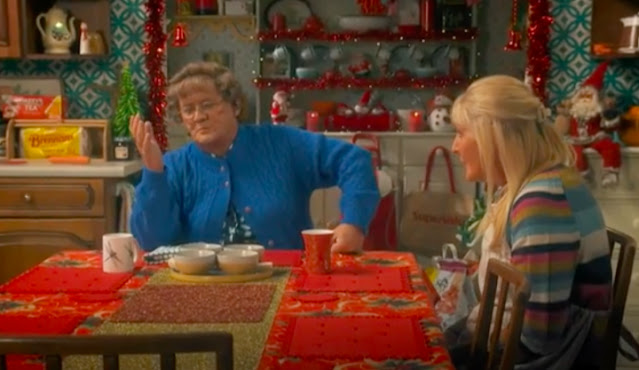Brendan O'Carroll and Jennifer Gibney in 'Shining Mammy', the Mrs Brown's Boys Christmas special (Credit: BBC)
A mother hen watching all her chicks, a sassy old lady full of tricks’. Mrs Brown’s Boys recently returned to BBC One for yet more festive specials. Astonishingly the last actual full series of non-seasonal episodes was transmitted ten years ago, though a new one is imminent. This Christmas’s were, reassuringly, exactly the same as they always have been.
In this case, ‘always’ goes back a long way. Although it only surfaced on the BBC in 2011, the ‘franchise’ – as we are now expected to call TV programmes, as if they were concessions for burger vans – originated in the mind of Brendan O’Caroll in 1992. But I think Mrs Brown and her incredibly unfashionable and incredibly popular brand of humour goes back a lot, lot further even than that.
2011 itself seems a long time ago now. The very idea of a new live audience, studio-recorded sitcom revolving around an extremely provincial, entirely white working-class family led by a man in old fashioned panto-style drag making it on to the BBC was surprising in 2011. It is inconceivable that it could’ve happened at any later date. Mrs Brown just made it under the wire before the Great Cultural Horror began. Unsurprisingly she is held in particular horror by progressives and people of taste, but plenty of conservatives hold her in equal contempt.
Mrs Brown’s Boys is a glorious aberration. In an age of irony, sophistication, disconnection and darkness – where sadcoms like Stath Lets Flats and After Life (I like both) rule the roost, and even something as wonderfully warm as Friday Night Dinner has an unsettling streak – this is lizard brain humour. There used to be a lot more of this: comedy where you can see the joke coming from miles away, and it doesn’t really matter if it’s actually that funny when it finally arrives.
I grew up on a diet of this, but I think it is literally incomprehensible to the young. A friend of mine in his early 20s sat down to watch Carry On Abroad with me recently and was utterly nonplussed. ‘But the jokes are so obvious and so bad,’ he protested, two minutes in. (For the same reason, it is instructive to watch ancient comedies on the ITV Hub. When the adverts for Trivago, Deliveroo, etc erupt in the middle of On The Buses it’s like seeing a spaceship landing at the coronation of Queen Anne.)
As with the Carry Ons, the humour of Mrs Brown comes from the physicality and the interactions of the very broad, knowing performances rather than the story or even the jokes. The gratuitous musical score in a Carry On is essential. For Mrs Brown, the equivalent ingredient is the live studio audience, revealed at the top of every episode and regularly cut away to throughout.
The breaking of the ‘fourth wall’, in comedy or drama, is regarded as unusual and innovative. In fact it is having a fourth wall that is odd, and it is we who are strange in that regard. We may find Shakespearean soliloquies and asides to the audience bizarre, but think of our own convention of actors frantically gurning their character’s real inner feelings and none of the other characters noticing.
For this is the vanishing, vanished, humour of every century before our one. Mrs Brown is the descendant not only of Arthur Lucan’s Irish washerwoman Old Mother Riley, but the titular heroine of Gammer Gurton’s Needle, the earliest extant English comedy play of 1559, an alternately fussy/ crude old lady with farcical domestic issues who breaks character for the sake of the most rotten, filthiest puns.
This is comedy performing its basic human function of physical social bonding. It is convivial and communal, the ghost of the music hall, the knees-up, the family get-together, the singalong dance (the Christmas special broke into one!), the works beano. Going further back, to the village waits and mummers. It is an egalitarian celebration, all about physical togetherness and proximity, uniting a tribe.
It is no surprise that people raised in the atomised, dislocated twenty first century cannot understand this, and often make a point of saying how much they hate studio audiences and ‘canned’ laughter (a practise never employed on British TV). It’s interesting that the 2014 Mrs Brown D’Movie, robbed of this, made up for it with a whooping score, looks to camera, inclusion of bloopers, etc. The Absolutely Fabulous film didn’t even try, and Edina and Patsy were revealed in the cold light of cinema as utter monsters.
Mrs Brown’s Boys is convivial and communal, the ghost of the music hall, the knees-up, the family get-together
The two Mrs Brown Christmas specials just transmitted were thankfully unmodernised in any way. The story of daughter Cathy Brown (played by O’Carroll’s wife Jennifer Gibney, who is underappreciated as the straight anchor of the show) taking up with a new boyfriend who is suspected of being a vampire was ludicrous from beginning to end. The first episode was the better of the two, with a joyous sequence of Mrs Brown babysitting the supposed vampire’s twin daughters, exact replicas of the floating, spooky sisters from The Shining. I’m sorry to report that I laughed myself silly.
This was my culture, this was our culture not so very long ago, in my childhood back in nineteen hundred and frozen to death. Sentimental, vulgar, repetitive, obvious, crude and silly; made by and for people who didn’t have the time or the inclination for sophistication. It is warm in a very cold world. As its final exponent, long may Mrs Brown reign over us.
Tags
RECENT
